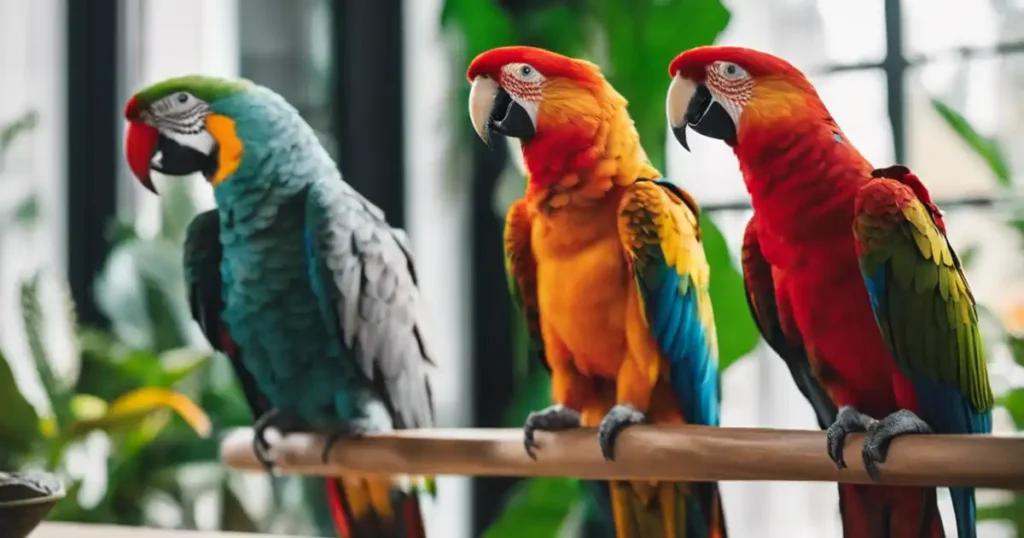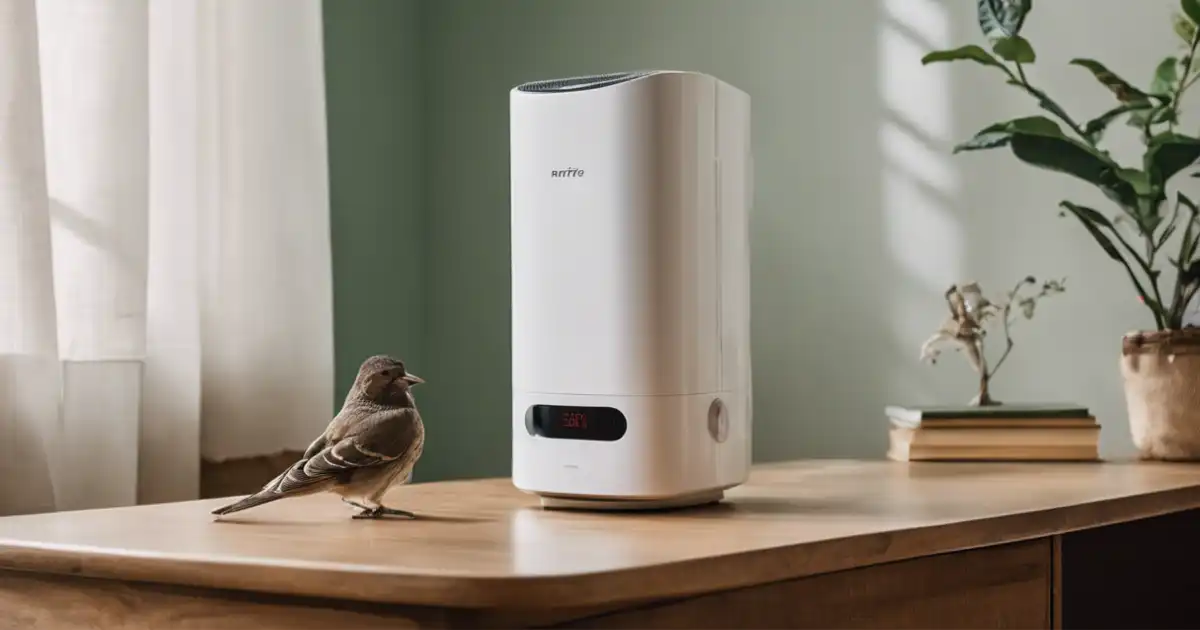As a bird owner, one of your top priorities should be keeping your feathered friend happy and healthy within a safe environment. Birds have susceptible respiratory systems, making them more vulnerable to poor indoor air quality.
This concern is why many bird owners opt to invest in air purifiers to combat bad indoor air quality. But are air purifiers safe for birds?
The short answer is yes— air purifiers are generally safe for birds when appropriately used, but there’s a catch. Some purifiers produce ozone to eliminate pollutants. They are highly dangerous for birds. So, you should steer clear of them.
Let’s dive into the details and ensure our birds get nothing but the freshest, safest air they deserve!
Are Air Purifiers Safe for Birds – Detailed Answer
When it comes to our feathered companions, ensuring their well-being is paramount. So, let’s unpack the nitty-gritty details about air purifiers and their safety for our beloved birds.
The Good: How Air Purifiers Benefit Birds
The air where our pet birds live can have lots of pollutants that can harm their breathing over time. This includes:
- Accumulating dust, pet dander, and mites circulate through disturbed cage air
- Food particles and dried bird poop release irritating particulate matter into the environment
- Gasses like cooking fumes and harmful chemicals from household cleaners linger in the still, stagnant indoor air
Our homes don’t have the same airflow as outdoors to clear away tiny pollutants that build up in the air. As a result, irritants persist and build up concentration over time.
The solution is to filter out these harmful indoor pollutants. This is where air purifiers come in! They can effectively remove dust, pet fur, and other pollutants from the air. Activated carbon air purifiers can also eliminate the odor of bird droppings.
The Bad: Ozone-Producing Purifiers
Now, let’s talk about the catch. While most air purifiers are safe, there are some that are a potential hazard: called ionizer purifiers. They release ozone as a by-product of their air cleaning process. Ozone is a corrosive chemical that can damage the lungs of both humans and birds.
Even small amounts are dangerous. So, air purifiers that intentionally emit ozone should never be used around birds or even humans.
Air Purifiers That Are Safe
Fortunately, there are plenty of ozone-free air purifiers that use other methods to clean the air. Their key components include:
- HEPA Filter – Effectively clean the air by trapping pollutants like dust, pet dander, and mold.
- Activated carbon Filter – Absorbs fumes, odors, and chemicals without posing risks.
When you’re looking for an air purifier for your birds, make sure to check the product details and reviews. Say no to ozone emission.
Why are Birds Sensitive to Air Pollution?
Birds Have Sensitive Respiratory Systems
Birds have radically different lung structures compared to mammals like humans and dogs. Instead of inflating and deflating like our lungs, a bird’s respiratory system relies on air sacs that keep air moving in a unidirectional loop through the lungs.
Oxygen passes through the tissues more efficiently thanks to that non-stop airflow. But pollutants also weave their way in more easily.
They Inhale More Oxygen Than Humans
On top of distinct lung anatomy, birds also sport far higher metabolic rates than us – their hearts beat up nearly three times faster! This intense internal motor requires extra oxygen to keep running.
As a result, birds breathe in much more air relative to their size. This also means increased inhalation of airborne pollutants. The more they are exposed, the worse it gets when irritants go into their respiratory system.
Specific components of indoor air pollution affect birds through different mechanisms:
- Cigarette smoke and formaldehyde irritate mucous membranes in airways
- Volatile chemicals directly enter the bloodstream through air capillaries
- Mold spores trigger sinus inflammation and respiratory infections
- Dust, bird dander, and mites can obstruct air capillaries and reduce oxygen delivery
Simply put, birds breathe differently, and that makes them more exposed to airborne pollutants. So, providing them with fresh air is crucial for long-term health. Hence, the importance of air purifiers.
Do Parrots Need Air Purifiers?

Yes! Air purifiers are beneficial to use around Parrots. Like all other birds, Parrots have uniquely vulnerable respiratory systems. Widely kept as pets, these tropical birds evolved delicate systems for cleaner rainforest air. But indoor conditions cause chronic issues:
Dust and Dander: Particulates clog extra sensitive air capillaries much easier. This leads to labored breathing over time and reduced oxygen circulation.
Kitchen Fumes: Parrots’ cages are often placed in kitchens or dens where they are exposed to harsh cooking byproducts daily. Over time, build-up leads to tissue irritation and damage.
Allergies and Sensitivities: Many parrots have latent environmental sensitivities to molds, pollen, or even naturally occurring bird dander. HEPA filters targeting allergens help minimize reactions.
Respiratory Infections: Poor air quality compromises immune response, leaving parrots prone to dangerous secondary sinus, air sac, and lung infections.
Continuous exposure to these risks can lead to stress hormones being released, making the bird’s immune system even weaker.
So, the verdict is that parrots definitely benefit from air purifiers. Their sensitive respiratory systems face challenges in indoor environments, from dust to kitchen fumes. Air purifiers act as silent protectors, ensuring our feathered friends breathe in fresh and clean air.
Choosing a Bird-Safe and Effective Air Purifier
Selecting just the right air purifying unit to safely share space with your bird takes some careful evaluation. Let’s explore the most important factors to focus on when buying an air purifier for birds.
Avoid Ozone Generators
As covered already, air purifiers that produce ozone unintentionally as a by-product are an absolute no-go for bird owners. Even a small amount of ozone can irritate the bird’s respiratory system. So, it’s crucial to check that the air purifier you’re considering doesn’t produce this harmful gas.
Filtration Technology
Stick with true HEPA and Activated carbon filtration models.
- True HEPA filter is excellent at trapping particulate matter like dust, dander, and pollen that can aggravate respiratory conditions
- Activated carbon layer helps eliminate odors, fumes, and gasses that are unsafe if inhaled
CARB Certified Models
Look for purifiers bearing the CARB certification when exploring your options. CARB-certified models undergo independent testing to verify their efficacy to filter out pollutants without emitting harmful substances.
Quiet Mode:
Birds are sensitive to noise, and a quiet operation ensures a stress-free atmosphere. Choose an air purifier that doesn’t make too much noise. Some purifiers also come with a quiet mode, offering a peaceful environment for your feathered friend.
Coverage Capacity
Air purifiers work best when the unit’s rated capacity aligns with the square footage of the placement area. A model that is too small won’t effectively clean the entire space. Match the purifier’s CADR rating to the size of the room and the air circulation needs of your bird’s habitat for optimal effectiveness.
Tips for Better Air Quality Around Birds
Caring for our feathered friends requires vigilance about indoor air quality threats. Alongside proper air purification, we must minimize products and conditions producing dangerous fumes in our homes. Let’s review key steps to promote healthy indoor air for birds:
- Diligent Cleaning – Wash perches and toys weekly, reducing hidden allergens and refreshing their playthings. Vacuum and dust regularly around the cage to control the settling of ambient air particles.
- Avoid Nonstick Cookware – Nonstick pots and pans with Teflon or other “PFAS” coatings emit deadly gasses when overheated. This can kill birds within minutes if inhaled. Stick to stainless steel or ceramic cookware only.
- Stop Using Self-Cleaning Oven Modes – High-heat self-cleaning oven cycles release airborne toxins that can be quickly fatal to birds in your home. Instead, manually scrub the oven cavity using baking soda.
- Analyze Hair Dryer & Iron Safety – Some models give off lots of fumes during use. Evaluate tag specifications to ensure appliances meet safety standards for use around birds before bringing them home.
- Skip Air Fresheners & Fragrances – Artificial scents from sprays, plug-in diffusers, or scented candles contain volatile organic compounds (VOCs) that are irritating to delicate respiratory systems. Open windows naturally instead.
- Control Waste & Dander – Bird poop and dander should be cleaned up promptly before particulate matter circulates in the air. Use HEPA vacuum attachments to manage dust and debris build-up over time.
Wrapping Up
When it comes to protecting our dear feathered friends, their health and happiness should always come first. As we explored here, using an air purifier can be an excellent way to create a cleaner, safer environment for them. But heads up – not all purifiers are safe to use around birds.
We’ve got to put in the research to find bird-safe models that don’t pump out ozone during operation. Safety also means putting your appliance in the right spot in your space and changing filters on schedule.
Combine a solid air filtering machine with the other tips we covered. If we put care into giving our flock fresh, purified air and healthy environments, they’ll thank us!
FAQs
Where should I put an air purifier with birds?
Place your air purifier where your feathered friends spend most of their time – preferably a few feet away from their cages. Avoid direct drafts to keep them comfortable, and ensure the purifier isn’t blowing air directly into their space.
Do air purifiers help with bird dust?
Yes, HEPA air purifiers are designed to effectively capture tiny particles, including those associated with bird dust. If you are dealing with bird dust, HEPA filter is the ideal choice to look in a purifier.
Do air purifiers remove smells?
Yes, purifiers can get rid of smells, especially the type of air purifier with activated carbon filters. These filters grab onto the stinky stuff, making the air clean and fresh. So, if you want to kick out bad odors, go for an air purifier with activated carbon filters.
Is bird dander harmful?
Yes, bird dander can be harmful, especially for individuals with allergies or respiratory problems. It contains proteins that may trigger allergic reactions or exacerbate existing respiratory conditions. Using air purifiers with HEPA filters can help minimize the impact of bird dander in indoor spaces.
What do air fresheners do to birds?
Air fresheners can harm birds as they often contain volatile organic compounds (VOCs) and other chemicals. These chemicals might cause problems like trouble breathing or irritation. So, It’s better not to use air fresheners or similar stuff around birds.

